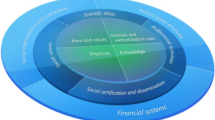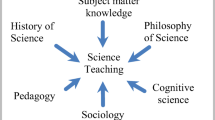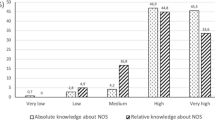Abstract
Nature of science (NOS) has for a long time been regarded as a key component in science teaching. Much research has focused on students’ and teachers’ views of NOS, while less attention has been paid to teachers’ perspectives on NOS teaching. This article focuses on in-service science teachers’ ways of talking about NOS and NOS teaching, e.g. what they talk about as possible and valuable to address in the science classroom, in Swedish compulsory school. These teachers (N = 12) are, according to the national curriculum, expected to teach NOS, but have no specific NOS training. The analytical framework described in this article consists of five themes that include multiple perspectives on NOS. The results show that teachers have less to say when they talk about NOS teaching than when they talk about NOS in general. This difference is most obvious for issues related to different sociocultural aspects of science. Difficulties in—and advantages of—NOS teaching, as put forth by the teachers, are discussed in relation to traditional science teaching, and in relation to teachers’ perspectives on for which students science teaching will be perceived as meaningful and comprehensible. The results add to understanding teachers’ reasoning when confronted with the idea that NOS should be part of science teaching. This in turn provides useful information that can support the development of NOS courses for teachers.
Similar content being viewed by others
Notes
Compulsory school comprises years 1–9 (ages 7–16) and is divided into three stages (i) years 1–3, (ii) years 4–6, and (iii) years 7–9, with students mostly changing teachers at each consecutive stage.
Note, however, that this refers to the frequencies of the different “ways of talking”, not to how common different “views” are.
References
AAAS. (1993). Benchmarks for science literacy. New York: Oxford University Press.
Abd-El-Khalick, F. (2001). Embedding nature of science instruction in preservice elementary science courses: Abandoning scientism, but…. Journal of Science Teacher Education, 12(3), 215–233.
Abd-El-Khalick, F. (2012). Nature of science in science education: Toward a coherent framework for synergistic research and development. In B. J. Fraser, K. Tobin, & C. McRobbie (Eds.), Second international handbook of science education (Vol. 2, pp. 1041–1060). Berlin: Springer.
Abd-El-Khalick, F. (2013). Teaching with and about nature of science, and science teacher knowledge domains. Science & Education, 22(9), 2087–2107.
Abd-El-Khalick, F., Bell, R. L., & Lederman, N. G. (1998). The nature of science and instructional practice: Making the unnatural natural. Science Education, 82(4), 417–436.
Abd-El-Khalick, F., & Lederman, N. G. (2000). Improving science teachers’ conceptions of nature of science: A critical review of the literature. International Journal of Science Education, 22(7), 665–701.
Aikenhead, G. S. (2006). Science education for everyday life: Evidence-based practice. New York: Teachers College Press.
Akerson, V. L., & Hanuscin, D. L. (2007). Teaching nature of science through inquiry: Results of a 3-year professional development program. Journal of Research in Science Teaching, 44(5), 653–680.
Allchin, D. (2003). Scientific myth-conceptions. Science Education, 87(3), 329–351.
Allchin, D. (2011). Evaluating knowledge of the nature of (whole) science. Science Education, 95(3), 518–542.
Allchin, D. (2012a). The Minnesota case study collection: New historical inquiry case studies for nature of science education. Science & Education, 21(9), 1263–1281.
Allchin, D. (2012b). Toward clarity on whole science and KNOWS. Science Education, 96(4), 693–700.
Allchin, D. (2014). From science studies to scientific literacy: A view from the classroom. Science & Education, 23(9), 1911–1932.
Alters, B. J. (1997). Whose nature of science? Journal of Research in Science Teaching, 34(1), 39–55.
Bartholomew, H., Osborne, J., & Ratcliffe, M. (2004). Teaching students “ideas-about-science”: Five dimensions of effective practice. Science Education, 88(5), 655–682.
Barton, A. C., & Yang, K. (2000). The culture of power and science education: Learning from Miguel. Journal of Research in Science Teaching, 37(8), 871–889.
Bartos, S. A., & Lederman, N. G. (2014). Teachers’ knowledge structures for nature of science and scientific inquiry: Conceptions and classroom practice. Journal of Research in Science Teaching, 51(9), 1150–1184.
Bell, R. L., Blair, L. M., Crawford, B. A., & Lederman, N. G. (2003). Just do it? Impact of a science apprenticeship program on high school students’ understandings of the nature of science and scientific inquiry. Journal of Research in Science Teaching, 40(5), 487–509.
Bell, R. L., Lederman, N. G., & Abd-El-Khalick, F. (2000). Developing and acting upon one’s conception of the nature of science: A follow-up study. Journal of Research in Science Teaching, 37(6), 563–581.
Brickhouse, N. W. (1990). Teachers’ beliefs about the nature of science and their relationship to classroom practice. Journal of Teacher Education, 41(3), 53–62.
Brickhouse, N. W. (2001). Embodying science: A feminist perspective on learning. Journal of Research in Science Teaching, 38(3), 282–295.
Brickhouse, N. W., & Bodner, G. M. (1992). The beginning science teacher: Classroom narratives of convictions and constraints. Journal of Research in Science Teaching, 29(5), 471–485.
Campanile, M. F., Lederman, N. G., & Kampourakis, K. (2015). Mendelian genetics as a platform for teaching about nature of science and scientific inquiry: The value of textbooks. Science & Education, 24(1–2), 205–225.
Carlone, H. B. (2003). Innovative science within and against a culture of “achievement”. Science Education, 87(3), 307–328.
Carlone, H. B. (2004). The cultural production of science in reform-based physics: Girls’ access, participation, and resistance. Journal of Research in Science Teaching, 41(4), 392–414.
Clough, M. P. (2006). Learners’ responses to the demands of conceptual change: Considerations for effective nature of science instruction. Science & Education, 15(5), 463–494.
Clough, M. P. (2007). Teaching the nature of science to secondary and post-secondary students: Questions rather than tenets. Paper presented at The Pantaneto Forum.
Clough, M. P. (2011a). Teaching and assessing the nature of science. The Science Teacher, 78(6), 56.
Clough, M. P. (2011b). The story behind the science: Bringing science and scientists to life in post-secondary science education. Science & Education, 20(7–8), 701–717.
Clough, M. P., & Olson, J. K. (2012). Impact of nature of science and science education course on teachers’ nature of science classroom practices. In M. S. Khine (Ed.), Advances in nature of science research: Concepts and methodologies (pp. 247–266). Dordrecht; Netherlands: Springer.
Dadachanji, D. K. (1998). The cultural challenge to scientific knowledge. World and I, 13, 172–178.
Driver, R., Leach, J., Millar, R., & Scott, P. (1996). Young people’s images of science. Bristol, PA: Open University Press.
Duschl, R., Erduran, S., Grandy, R., & Rudolph, J. (2006). Guest editorial: Science studies and science education call for papers deadline: March 31, 2007. Science Education, 90(6), 961–964.
Duschl, R. A., & Grandy, R. (2013). Two views about explicitly teaching nature of science. Science & Education, 22(9), 2109–2139.
Duschl, R. A., & Wright, E. (1989). A case-study of high-school teachers decision-making models for planning and teaching science. Journal of Research in Science Teaching, 26(6), 467–501.
Eflin, J. T., Glennan, S., & Reisch, G. (1999). The nature of science: A perspective from the philosophy of science. Journal of Research in Science Teaching, 36(1), 107–116.
Erduran, S., & Dagher, Z. R. (2014). Reconceptualizing the nature of science for science education: Scientific knowledge, practices and other family categories. Dordrecht: Springer.
Erduran, S., & Mugaloglu, E. Z. (2013). Interactions of economics of science and science education: Investigating the implications for science teaching and learning. Science & Education, 22(10), 2405–2425.
Freedman, K. L. (2009). Diversity and the fate of objectivity. Social Epistemology, 23(1), 45–56.
Gess-Newsome, J., & Lederman, N. G. (1993). Preservice biology teachers’ knowledge structures as a function of professional teacher education: A year-long assessment. Science Education, 77(1), 25–45.
Glaser, B. G., & Strauss, A. L. (1967). The discovery of grounded theory: Strategies for qualitative research. New York: Aldine de Gruyter.
Gyllenpalm, J., Wickman, P.-O., & Holmgren, S.-O. (2010). Secondary science teachers’ selective traditions and examples of inquiry-oriented approaches. Nordic Studies in Science Education, 6(1), 44–60.
Hansson, L., & Lindahl, B. (2010). “I have chosen another way of thinking”. Students’ relations to science with a focus on worldview. Science & Education, 19, 895–918.
Hanuscin, D. L. (2013). Critical incidents in the development of pedagogical content knowledge for teaching the nature of science: A prospective elementary teacher’s journey. Journal of Science Teacher Education, 24(6), 933–956.
Hanuscin, D. L., Lee, M. H., & Akerson, V. L. (2011). Elementary teachers’ pedagogical content knowledge for teaching the nature of science. Science Education, 95(1), 145–167.
Henke, A., & Höttecke, D. (2015). Physics teachers’ challenges in using history and philosophy of science in teaching. Science & Education, 24(4), 349–385.
Herman, B. C., Clough, M. P., & Olson, J. K. (2013). Teachers’ nature of science implementation practices 2–5 years after having completed an intensive science education program. Science Education, 97(2), 271–309.
Hodson, D. (1993). Philosophic stance of secondary school science teachers, curriculum experiences, and children’s understanding of science: Some preliminary findings. Interchange, 24(1–2), 41–52.
Hodson, D. (2009). Teaching and learning about science: Language, theories, methods, history, traditions and values. Rotterdam: Sense Publishers.
Hodson, D. (2014). Learning science, learning about science, doing science: Different goals demand different learning methods. International Journal of Science Education, 36(15), 2534–2553.
Hodson, D., & Wong, S. L. (2014). From the horse’s mouth: Why scientists’ views are crucial to nature of science understanding. International Journal of Science Education, 36(16), 2639–2665.
Högström, P., Ottander, C., & Benckert, S. (2006). Lärares mål med laborativt arbete: Utveckla förståelse och intresse. Nordic Studies in Science Education, 2(3), 54–66.
Höttecke, D., Henke, A., & Riess, F. (2012). Implementing history and philosophy in science teaching: Strategies, methods, results and experiences from the European HIPST project. Science & Education, 21(9), 1233–1261.
Ideland, M., & Malmberg, C. (2012). Body talk: Students’ identity construction while discussing a socioscientific issue. Cultural Studies of Science Education, 7(2), 279–305.
Irzik, G. (2010). Why should philosophers of science pay attention to the commercialization of academic science? In M. Suárez, M. Dorato, & M. Rédei (Eds.), EPSA epistemology and methodology of science (pp. 129–138). Dordrecht: Springer.
Irzik, G., & Nola, R. (2011). A family resemblance approach to the nature of science for science education. Science & Education, 20(7), 591–607.
Irzik, G., & Nola, R. (2014). New directions for nature of science research. In M. R. Matthews (Ed.), International handbook of research in history, philosophy, and science teaching (pp. 999–1021). Dordrecht: Springer.
Jenkins, E. W. (2013). The ‘nature of science’ in the school curriculum: The great survivor. Journal of Curriculum Studies, 45(2), 132–151.
Johansson, A.-M., & Wickman, P.-O. (2012). Vad ska elever lära sig angående naturvetenskaplig verksamhet?-En analys av svenska läroplaner för grundskolan under 50 år.” What should students learn about scientific inquiry? A comparative study of 50 years of the Swedish national curricula.”. Nordic Studies in Science Education, 8(3), 197–212.
Khishfe, R. (2012). Relationship between nature of science understandings and argumentation skills: A role for counterargument and contextual factors. Journal of Research in Science Teaching, 49(4), 489–514.
Khishfe, R. (2014). Explicit nature of science and argumentation instruction in the context of socioscientific issues: An effect on student learning and transfer. International Journal of Science Education, 36(6), 974–1016.
Knorr-Cetina, K. (1999). Epistemic cultures: How the sciences make knowledge. Cambridge, Mass: Harvard University Press.
Lakin, S., & Wellington, J. (1994). Who will teach the ‘nature of science’? Teachers’ views of science and their implications for science education. International Journal of Science Education, 16(2), 175–190.
Latour, B. (1987). Science in action: How to follow scientists and engineers through society. Cambridge, Mass: Harvard University Press.
Lederman, N. G. (1992). Students’ and teachers’ conceptions of the nature of science: A review of the research. Journal of Research in Science Teaching, 29(4), 331–359.
Lederman, N. G. (1995). Suchting on the nature of scientific thought: Are we anchoring curricula in quicksand? Science & Education, 4(4), 371–377.
Lederman, N. G. (1999). Teachers’ understanding of the nature of science and classroom practice: Factors that facilitate or impede the relationship. Journal of Research in Science Teaching, 36(8), 916–929.
Lederman, N. G. (2007). Nature of science: Past, present, and future. In S. K. Abell & N. G. Lederman (Eds.), Handbook of research on science education (pp. 831–879). Mahwah, NJ: Lawrence Erlbaum Associates, Publishers.
Lederman, N. G., & Abd-El-Khalick, F. (1998). Avoiding de-natured science: Activities that promote understandings of the nature of science. In W. F. McComas (Ed.), The nature of science in science education: Rationales and strategies (pp. 83–126). Dordrecht: Kluwer Academic.
Lederman, N. G., Abd-El-Khalick, F., Bell, R. L., & Schwartz, R. S. (2002). Views of nature of science questionnaire: Toward valid and meaningful assessment of learners’ conceptions of nature of science. Journal of Research in Science Teaching, 39(6), 497–521.
Lederman, N. G., & Lederman, J. S. (2012). Nature of scientific knowledge and scientific inquiry: Building instructional capacity through professional development. In B. J. Fraser, et al. (Eds.), Second international handbook of science education (Vol. 1, pp. 335–359). Berlin: Springer.
Longino, H. E. (1990). Science as social knowledge: Values and objectivity in scientific inquiry. Princeton, NJ: Princeton University Press.
Matthews, M. R. (1994). Science teaching: The role of history and philosophy of science. New York: Routledge.
Matthews, M. R. (1998). In defense of modest goals when teaching about the nature of science. Journal of Research in Science Teaching, 35(2), 161–174.
Matthews, M. R. (2012). Changing the focus: From nature of science (NOS) to features of science (FOS). In M. S. Khine (Ed.), Advances in nature of science research: Concepts and methodologies (pp. 3–26). Dordrecht: Springer.
McComas, W. F. (1998). The principal elements of the nature of science: Dispelling the myths. In W. F. McComas (Ed.), The nature of science in science education: Rationales and strategies (pp. 53–70). Dordrecht: Kluwer Academic.
McComas, W. F., Clough, M. P., & Almazroa, H. (1998). The role and character of the nature of science in science education. In W. F. McComas (Ed.), The nature of science in science education: Rationales and strategies (pp. 3–39). Dordrecht: Kluwer Academic.
McDonald, C. V. (2010). The influence of explicit nature of science and argumentation instruction on preservice primary teachers’ views of nature of science. Journal of Research in Science Teaching, 47(9), 1137–1164.
Mosco, V. (2012). Entanglements: Between two cultures and beyond science wars. Science as Culture, 21(1), 101–115.
Niaz, M. (2010). Science curriculum and teacher education: The role of presuppositions, contradictions, controversies and speculations vs Kuhn’s ‘normal science’. Teaching and Teacher Education, 26(4), 891–899.
Niaz, M. (2012). From ‘science in the making’ to understanding the nature of science: An overview for science educators. London: Routledge.
Nott, M., & Wellington, J. (1998). Eliciting, interpreting and developing teachers’ understandings of the nature of science. Science & Education, 7(6), 579–594.
Osborne, J., Collins, S., Ratcliffe, M., Millar, R., & Duschl, R. (2003). What “ideas-about-science” should be taught in school science? A Delphi study of the expert community. Journal of Research in Science Teaching, 40(7), 692–720.
Pickering, A. (1995). The mangle of practice: Time, agency, and science. Chicago: University of Chicago Press.
Potter, J., & Wetherell, M. (2007). Discourse and social psychology: Beyond attitudes and behaviour. London: Sage.
Ramazanoglu, C., & Holland, J. (2002). Feminist methodology [Elektronisk resurs] challenges and choices. London: Sage.
Rudolph, J. L. (2005). Epistemology for the masses: The origins of “The Scientific Method” in American schools. History of Education Quarterly, 45(3), 341–376.
Ryder, J. (2002). School science education for citizenship: Strategies for teaching about the epistemology of science. Journal of Curriculum Studies, 34(6), 637–658.
Ryder, J., Leach, J., & Driver, R. (1999). Undergraduate science students’ images of science. Journal of Research in Science Teaching, 36(2), 201–219.
Schwartz, R., & Lederman, N. G. (2002). “It’s the nature of the beast”: The influence of knowledge and intentions on learning and teaching nature of science. Journal of Research in Science Teaching, 39(3), 205–236.
Shulman, L. S. (1986). Those who understand: Knowledge growth in teaching. Educational Researcher, 15(2), 4–14.
Sjøberg, S. (2010). Naturvetenskap som allmänbildning: En kritisk ämnesdidaktik. Lund: Studentlitteratur.
Skolverket. (2011a). Curriculum for the compulsory school system, the pre-school class and the leisure-time centre 2011. Stockholm: Swedish National Agency for Education (Skolverket).
Skolverket. (2011b). Commentary to the physics curriculum. Stockholm: Swedish National Agency for Education (Skolverket).
Stenmark, M. (2004). How to relate science and religion: A multidimensional model. Grand Rapids, Mich: Eerdmans.
Tala, S., & Vesterinen, V.-M. (2015). Nature of science contextualized: Studying nature of science with scientists. Science & Education, 24(4), 435–457.
van Dijk, E. M. (2011). Portraying real science in science communication. Science Education, 95(6), 1086–1100.
Vesterinen, V.-M., Aksela, M., & Lavonen, J. (2013). Quantitative analysis of representations of nature of science in Nordic upper secondary school textbooks using framework of analysis based on philosophy of chemistry. Science & Education, 22(7), 1839–1855.
Wallace, J., & Loughran, J. (2012). Science teacher learning. In B. J. Fraser, et al. (Eds.), Second international handbook of science education (Vol. 1, pp. 295–306). Berlin: Springer.
Wong, S. L., & Hodson, D. (2010). More from the horse’s mouth: What scientists say about science as a social practice. International Journal of Science Education, 32(11), 1431–1463.
Author information
Authors and Affiliations
Corresponding author
Rights and permissions
About this article
Cite this article
Leden, L., Hansson, L., Redfors, A. et al. Teachers’ Ways of Talking About Nature of Science and Its Teaching. Sci & Educ 24, 1141–1172 (2015). https://doi.org/10.1007/s11191-015-9782-6
Published:
Issue Date:
DOI: https://doi.org/10.1007/s11191-015-9782-6




